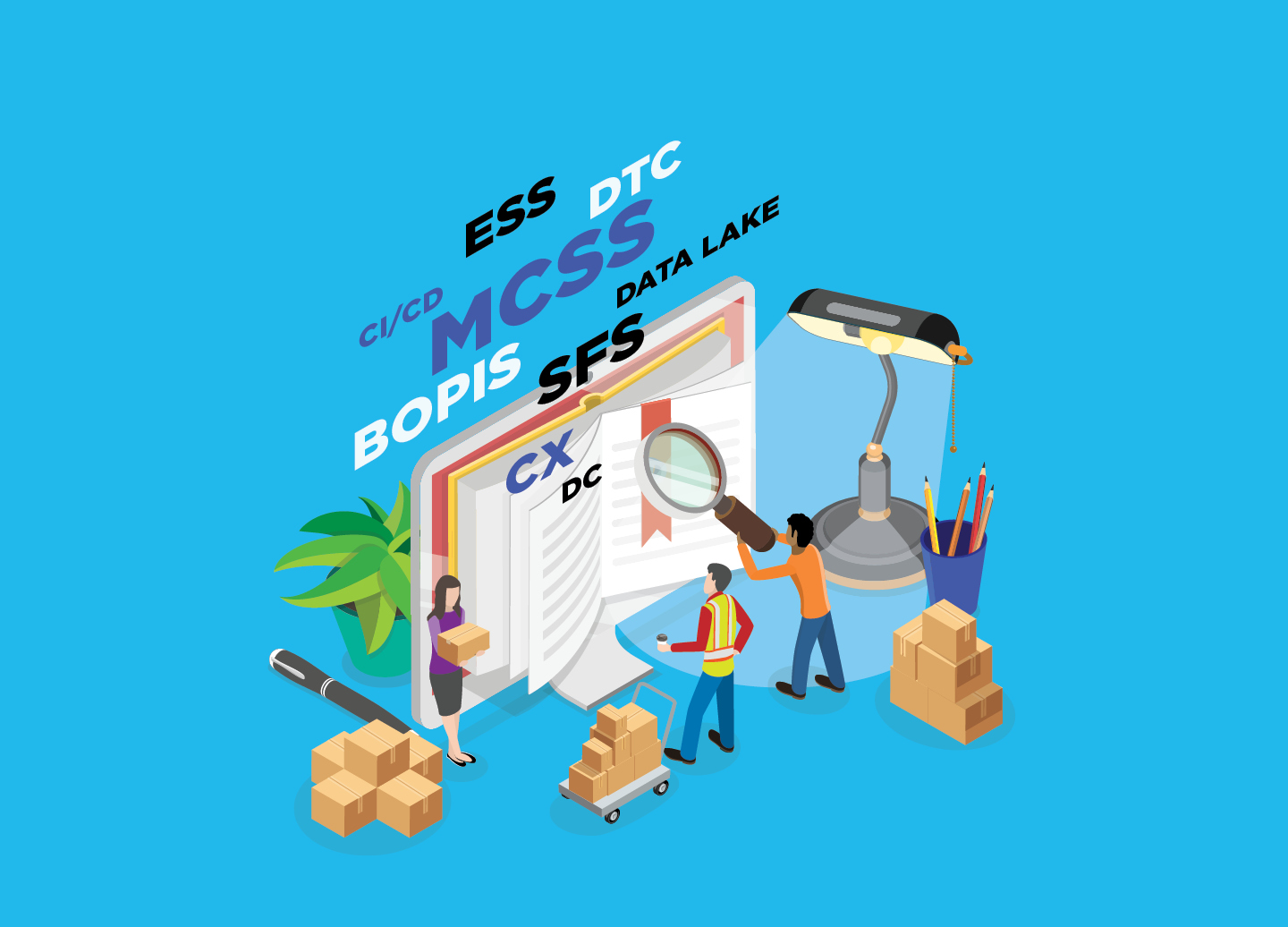Parcel Shipping Glossary: Acronyms, Abbreviations, and Confusing Terminology

ProShip has your cheat sheet for some of the most common acronyms used in the parcel shipping world.
The parcel shipping and logistics world has a landscape of commonly used acronyms and abbreviations. Whether you are new to this world or just looking to brush up on your industry knowledge, ProShip takes our duty to educate and support the supply chain and logistics community very seriously. Either with expert tips and tricks you hear on our podcast, watch on a video, or dive into in a shipping eBook, we strive to provide insightful and informative content for anyone wanting to learn about shipping and logistics. Keep reading to discover some of the most common abbreviations, acronyms, and terminology used in parcel shipping.
Parcel Shipping Glossary of Terms
We get a LOT of questions asking about certain parcel, shipping, and logistics terms. We’ve put together a comprehensive list of the terms we get asked about the most, but are we missing one that you have wondered about? Ask us on LinkedIn!
3PL
Third-party logistics is a partner that can perform outsourced supply chain operations and logistics including receiving shipments of stock, storing & tracking warehouse inventory, and picking & packing orders to ship to customers. Some 3PL companies also provide other logistics services, referred to as value added services. These include inventory management, kitting and assembly, postponement packaging, procurement, and others. Most 3PL warehouses serve many clients, sending orders through multiple carriers, for multiple e-commerce companies. [Explore how 3PLs are increasing efficiencies and lowering costs.]
ADS (Advanced Date Shopping)
Advanced Date Shopping includes planning for delivery by a target date. This complex algorithm includes 9 data sets to maximize cost and time to still meet the promised date.
API (Application Programming Interfaces)
Application programming interfaces (APIs) are technology interfaces that developers can use for programs to interact with each other and exchange information in real time.
API Aggregator
An API aggregator is a collection of APIs of the same type that provide a single point of implementation to deliver a unified and standardized API to represent all of them.
Batch Processing
A method of shipping that groups large quantities of shipments together into batches to produce their shipping labels all at the same time. Shippers often use batch processing when shipping a large quantity of shipments that each have the same weight, dimensions, and contents but different destination addresses.
Best Way Group
Also known as a rate shop group, this is a group of carrier services that are evaluated against each other based on shipping rates, transit time, or a combination of both.
BI (Business Intelligence)
Business Intelligence software gathers business data and displays it in user-friendly reports, dashboards, charts and graphs. Transportation business intelligence systems can include carrier information and shipping spend tracking.
BOPIS (Buy Online, Pickup In-Store)
Buy Online Pickup In-Store is a shipping option that allows a consumer to make a purchase online and pick up their order in-store, free of shipping costs. The order can be picked up in several ways including from a designated customer service or BOPIS pickup area, curbside pickup, or even using retail lockers.
CASS (Coding Accuracy System)
Coding Accuracy Support System enables the United States Postal Service (USPS) to evaluate the accuracy of software that corrects and matches street addresses. CASS certification is offered to all mailers, service bureaus, and software vendors that would like the USPS to evaluate the quality of their address-matching software and improve the accuracy of their ZIP+4, carrier route, and five-digit coding.
CI/CD (Continuous Improvement/Continuous Deployment)
Continuous improvement/continuous deployment is a software update strategy that helps software providers keep their users on the latest and greatest functionality and releases. CI is continuously integrating and automating new changes into the existing main codebase. Practically speaking, this is done with a version control software system that supports this and then tested with smaller conclusive changes. CD is deploying the changes that have been made in the CI process into release environments. [Why does this matter in a multi-carrier shipping software solution?]
Commercial Invoice
This document is used to get products cleared through customs in the country of import and is a detailed record of a transaction between buyer and seller used by customs agencies to clear shipments and calculate applicable duties and taxes. [Learn more about the Parts of a CI]
CX (Customer Experience)
Customer Experience is the overall impression your customers have of your brand throughout all aspects of the buyer's journey – including shipping. It results in their view of your brand and impacts the bottom-line including revenue but by how much? Dive into this blog to learn more.
Data Lake
A data lake is a centralized repository designed to store, process, and secure large amounts of structured, semi-structured, and unstructured data. It can store data in its native format and process any variety of it, ignoring size limits.
DC (Distribution Center)
Distribution Center is a warehouse or other specialized building, often with refrigeration or air conditioning, which is stocked with products (goods) to be redistributed to retailers, to wholesalers, or directly to consumers. A distribution center is a principal part, the order processing element, of the entire order fulfillment process.
DTC (Direct-To-Consumer)
Direct-to-consumer is selling products or services directly to consumers without the use of retailers or wholesalers as intermediates.
Drop Shipping
Drop shipping is an order fulfillment method where a business doesn’t keep the products it sells in stock. Unlike a traditional retailer, with drop shipping there is no inventory to purchase, no packages to send, no warehouse to maintain. Instead, a drop shipper sells products and fulfills orders by buying items from a third party that ships them directly to the customer. [Source]
E-Commerce Suite
An e-commerce suite is a package of services and software designed to allow a company to sell its products online. Exactly what is included can vary immensely from package to package.
ERP (Enterprise Resource Planning)
Enterprise Resource Planning is a software or set of integrated applications to manage core business activities. This solution typically shares a common database to streamline processes and information across the brand enabling the flow of data between a multitude of business processes.
ESS (Enterprise Software Stack)
Enterprise Software Stack is the set of software that enterprises use to execute their supply chain activities.
Hazmat
Hazardous materials are substances in quantities or forms that may pose a reasonable risk to health, property, or the environment. HAZMATs include such substances as toxic chemicals, fuels, nuclear waste products, and biological, chemical, and radiological agents. HAZMATs may be released as liquids, solids, gases, or a combination or form of all three, including dust, fumes, gas, vapor, mist, and smoke. Also referred to as Dangerous Goods.
Homegrown
A Home Grown system typically refers to a company’s software that has been developed internally or purchased and customized so much that it almost no longer resembles what it was originally.
LTL Freight
Less than a truckload freight is used when the shipment is large enough to require a pallet or material handling equipment for transit, but when the shipment does not fill an entire trailer. Freight carriers will deliver individual LTL shipments to different addresses.
Manifest
A manifest is a document or electronic record that lists all shipments that have been shipped out for a certain period.
MFN (Amazon's Merchant Fulfillment Network)
Amazon’s Merchant Fulfillment Network is a fulfillment method where sellers ship from their own homes, warehouses, or businesses after receiving an order through Amazon. Note, from the technical perspective, MFN is not an API; talking about it in that context is simply referring to the MFN functionality that the API offers. It is also not a seller program like Vendor Central or Seller Central – you do not sign up for or manage an MFN account. [Learn more about Amazon Fulfillment Methods.]
MCSS (Multi-Carrier Shipping Software)
Multi-carrier shipping software, or multi-carrier shipping solution is an advanced software solution that allows for rate shopping between a broad library of carriers incorporating business rules to execute shipments faster and more cost-effectively, streamlining workflows and bolstering positive customer experiences.
OMS (Order Management System)
An order management system, or order management software, is a software system that streamlines all aspects of the life cycle of an order, from managing inventory to the actual order processing. The system looks at all your inventory sources including stores, warehouses, third-party logistics (3PL) providers, or wherever your inventory is stored. [Why is OMS one of the most in-demand parcel shipping technologies?]
SFS (Ship-from-Store)
Ship-from-Store is a fulfillment process where retailers use stock from their brick-and-mortar stores to fulfill orders. Fulfilling orders this way transforms the store itself into a virtual distribution hub.
TMS (Transportation Management System)
A transportation management system is software used for planning, executing and optimizing the shipment of goods.
WISMO (Where is my order?)
This is an acronym for ‘where is my order?’ and it is typically used as a broad term to refer to track order requests via inbound customer inquiries for the status of the shipment after the customer places an order.
WMS (Warehouse Management System)
A Warehouse management system is a type of software that is widely used in the manufacturing and retail industries because it tracks all materials and goods as they come in and go out of the warehouse. In basic terms, a WMS helps optimize all your warehouse processes.
Ready to talk about your shipping software?
To find out how ProShip multi-carrier shipping software can help you supercharge your shipping operations to build a flexible and robust supply chain strategy, contact our experts today!

